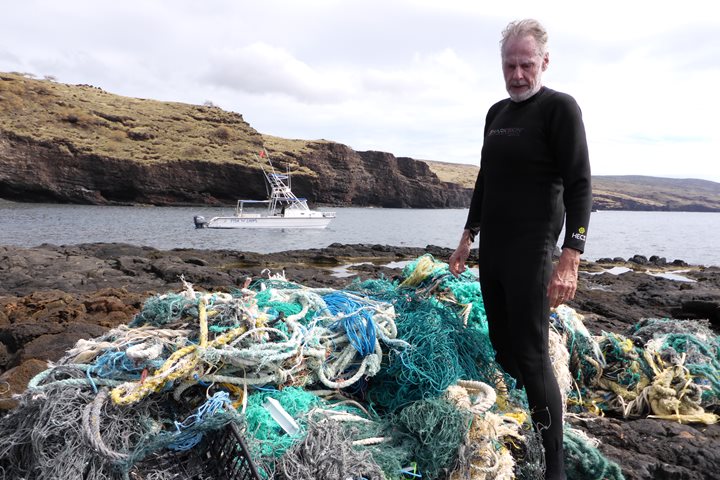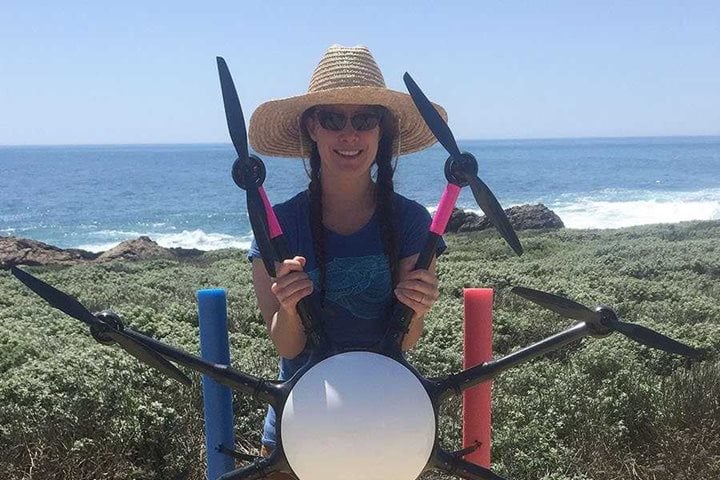“Someone once asked me, what’s the one tool you would want to give any student? And I said, ‘Hands down, mask and snorkel,’” the marine biologist Tierney Thys says in a National Geographic video. Why that tool? Because, as Thys explains, “Ninety-eight percent of the living space on this planet is ocean. It sure helps if you can see it.” Get Inspired by Photos, Videos, Webinars, Stories, and Exclusive Offers. Sign Up
Thys has devoted her career to seeing the ocean, and to helping others catch a glimpse of the incredible diversity of the underwater world. A big part of what motivates her work is the chance to instill a sense of awe about the magnificence of the ocean, and to get people involved in efforts to protect endangered marine ecosystems.
Since studying marine biology at Brown University in the late 1980s and earning her Ph.D. in biomechanics from Duke, Thys has focused her research on how sea animals live, and on how climate change is impacting marine environments. One animal in particular has fascinated her ever since she saw a picture of it on her grad school advisor’s door: the Mola Mola, or giant ocean sunfish, a funny-looking fish that has a flat body and feeds on jellyfish.
“It's really a silly fish," says Thys with a laugh, describing the creature on video. "It looks like a mistake. Where did the tail go?” The sunfish’s enormous and seemingly awkward shape — it can run as long as 10 feet and weigh upwards of 5,000 pounds — provides an entry point to understanding more about the behavior of organisms in the ocean, and about how environmental changes impact underwater ecosystems. Thys has received grants from the National Geographic Society for her work in satellite-tracking the elusive sunfish in oceans around the world.
An ecological warrior under the sea and on land
Thys’s work also takes her above ground, where she’s looking at ways to forge new connections between human populations and natural environments to help address social and environmental challenges. For instance, Thys and her research colleagues are working on developing evidence-based nature interventions for incarcerated people, and on using brain imaging to understand the effects of nature on mental well-being.
A charismatic speaker whose passion for her work comes is evident in every lecture, video, and public appearance she makes, Thys is a Research Associate at the California Academy of the Sciences, and she regularly shares her current projects via TED talks and through her longtime role as a National Geographic Explorer. She also produced two PBS series, Strange Days on Planet Earth and Shape of Life, as a past Director of Research for the Sea Studios Foundation. The organization creates visual media to educate the public, business community, and legislators about ecological challenges, and collaborated with eBay to stop the buying and selling of invasive species online.
Another mission close to Thys’s heart is getting people to rely less on plastic products. She serves on the board of a think tank called ThinkBeyondPlastic, which looks for innovative solutions that will help reduce the mind-boggling amount of plastic pollution — in the ocean and on land — by supporting alternative materials and new ways of packaging and delivering products.
As Thys juggles an impressive number of marine research projects, and uses her media platform to inspire fans and soon-to-be fans of underwater exploration, she somehow finds time to stay active beyond the lab and the video camera. She loves to scuba dive, pilot planes, run marathons, and share her fascination with nature with her own kids. Thys also appears as a Daily Explorer on the super-popular online game Animal Jam, which has 180 million players around the world.
Thys’s dedication to her work as a marine scientist and ecological warrior is infectious. For future female explorers wanting to pursue marine biology, environmental science and related fields — or simply wanting to experience ocean life firsthand on their travels — Thys is a role model and an inspiring guide to the infinite diversity, beauty and fragility of ocean life.
Although Thys spends much of her time observing and advocating for endangered marine ecosystems, she considers herself ultimately an optimist.
“I think we have a lot of bad news, but amidst the bad news we have lots of reason for hope,” says Thys in the National Geographic video.
“We have more marine protected areas now than we ever have in the past, and more are slated to be pushed through.” And that, she adds, “gives me tremendous hope.


